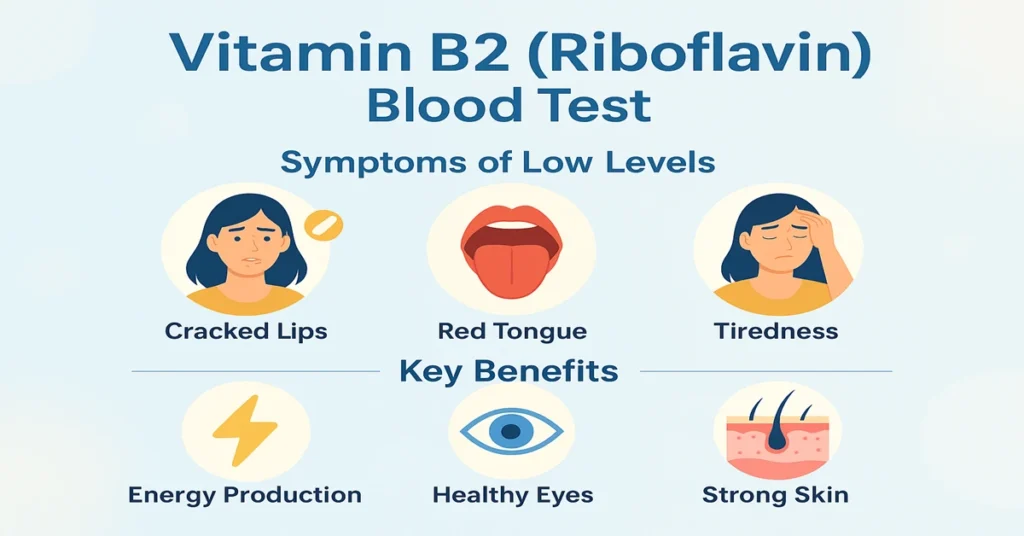What is Vitamin B2 (Riboflavin)?
Vitamin B2, also known as Riboflavin, is a water-soluble vitamin that belongs to the B-complex family.
It plays a key role in energy production, cellular metabolism, and the breakdown of fats, proteins, and carbohydrates.
Because Vitamin B2 is water-soluble, the body does not store it in large amounts, so it must be consumed regularly through the diet.
This vitamin is essential for:
- Healthy skin and eyes
- Nerve and brain function
- Energy production and growth
Where is Vitamin B2 Synthesized or Produced in the Body?
The human body does not produce Riboflavin naturally.
It must be obtained from food sources or, in small amounts, from gut bacteria.
However, this bacterial production is too little to fulfill the body’s daily requirements.
Best Dietary Sources of Vitamin B2:
- Milk and dairy products (milk, yogurt, cheese)
- Eggs
- Lean meats and poultry
- Green leafy vegetables (spinach, broccoli)
- Fortified cereals and grains
- Almonds and mushrooms
A balanced diet is usually enough to maintain healthy Vitamin B2 levels.
Main Functions and Importance of Vitamin B2
Vitamin B2 is involved in many metabolic and cellular functions in the body.
Key Roles:
- Energy Production:
Works as a coenzyme (FAD and FMN) in oxidation-reduction reactions — vital for converting food into energy. - Metabolism of Nutrients:
Helps the body process carbohydrates, fats, and proteins efficiently. - Antioxidant Support:
Regenerates glutathione, one of the body’s most powerful antioxidants that protects against oxidative damage. - Skin and Eye Health:
Maintains healthy skin, nails, and eyes; prevents dryness and irritation. - Red Blood Cell Formation:
Assists in producing RBCs and prevents anemia. - Nervous System Function:
Helps reduce fatigue, improve nerve function, and support brain performance.
Causes of Low Vitamin B2 Levels (Deficiency)
Vitamin B2 deficiency (called Ariboflavinosis) can occur due to dietary or medical reasons.
Common causes:
- Poor or unbalanced diet
- Chronic alcoholism (reduces absorption and utilization)
- Malabsorption conditions like celiac disease or inflammatory bowel disease
- Hypothyroidism (slower metabolism affects vitamin absorption)
- Certain medications (e.g., phenothiazines, tricyclic antidepressants, antimalarials)
- Increased demands during pregnancy, lactation, or heavy exercise
Symptoms of Low Vitamin B2 (Deficiency)
Low Riboflavin levels cause visible skin, mouth, and eye changes.
Common Deficiency Symptoms:
- Cracks and sores at the corners of the mouth (angular cheilitis)
- Swollen or red tongue (glossitis)
- Dry, flaky, or scaly skin
- Itchy or watery eyes, sensitivity to light (photophobia)
- Fatigue and general weakness
- Slow growth in children
- Numbness or burning in hands and feet (nerve-related)
Riboflavin deficiency often appears with other B-vitamin deficiencies (like B3 or B6) due to similar dietary causes.
Causes of High Vitamin B2 Levels
High Riboflavin levels are extremely rare, as any excess is excreted in urine.
However, elevated levels may result from:
- Excessive supplement intake
- High-dose multivitamin therapy
Symptoms of High Vitamin B2 Levels
- Vitamin B2 is non-toxic, even in high doses.
- The only visible sign of excess intake is bright yellow-colored urine (harmless and temporary).
No serious side effects have been reported even with supplementation.
Reference Ranges (Normal Levels)
| Type | Normal Range | Unit |
|---|---|---|
| Vitamin B2 (Riboflavin) | 6.2 – 39.0 | nmol/L |
Levels may slightly vary between laboratories.
Low results suggest deficiency, especially if accompanied by clinical symptoms.
Sample Type and Test Information
- Sample Type: Plasma or Serum
- Tube Used: Plain or EDTA tube (as per lab)
- Fasting: Not usually required
- Testing Method: Fluorometric assay or HPLC (High-Performance Liquid Chromatography)
How to Maintain Healthy Vitamin B2 Levels
- Include milk, eggs, meat, and leafy greens in your diet.
- Avoid excess alcohol which interferes with absorption.
- Eat fortified grains and cereals regularly.
- For vegetarians or people with poor diet, consider a B-complex supplement.
- Manage chronic conditions like thyroid disorders and gut diseases that can affect vitamin absorption.
Health Conditions Linked to Vitamin B2 Deficiency
Deficiency of Riboflavin can contribute to:
- Anemia (due to reduced RBC formation)
- Migraine headaches (linked with low cellular energy)
- Cataracts and eye strain
- Dry skin, mouth ulcers, and sore lips
- Peripheral neuropathy (nerve-related symptoms)
- Fatigue and muscle weakness
When Should You Get a Vitamin B2 Test?
A doctor may recommend this test if you have:
- Persistent mouth cracks or sore tongue
- Dry eyes or light sensitivity
- Unexplained fatigue or weakness
- Frequent infections or slow healing wounds
- Poor diet or absorption problems
- Liver, thyroid, or intestinal disorders
Test Preparation
- Fasting: Usually not required.
- Avoid taking Vitamin B supplements for 24–48 hours before the test (unless prescribed).
- Inform your doctor about all medications and supplements.
- Stay hydrated and avoid alcohol 24 hours before sample collection.
When to Consult a Doctor
Consult your doctor if:
- You have persistent mouth cracks, red tongue, or dry eyes
- You feel tired or weak without clear reason
- You suffer from digestive issues or chronic alcoholism
- Your test shows Vitamin B2 levels < 6.2 nmol/L
Treatment may include:
- Dietary changes
- B-complex supplements
- Managing underlying absorption issues
Important Word Explanations
| Term | Meaning |
|---|---|
| Riboflavin | Scientific name for Vitamin B2 |
| Water-soluble | Dissolves in water; not stored in the body |
| Ariboflavinosis | Deficiency disease caused by lack of Vitamin B2 |
| Glossitis | Swelling and redness of the tongue |
| Photophobia | Light sensitivity of the eyes |
| HPLC | High-Performance Liquid Chromatography – lab testing method |
~END~

